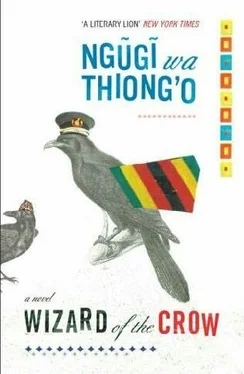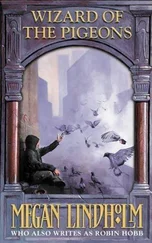He often lost sleep trying to figure out how she could have slipped his grasp on the day they had first gone after her. How had she fled without leaving a trace? he would ask himself bitterly, time and again.
Suddenly an idea came to him. What if Wangahü and his wife, Roithi, were to go to the offices of Silver Sikiokuu and before media reporters and television cameras make a teary appeal for their daughter to give herself up? And even threaten to disown her should she fail to heed their call?
“You have asked a good question,” he said. “I can help you. Refore the Ruler left for America, he appointed me not only as deputy chairman of the Committee for Marching to Heaven but chairman of the commission inquiring into the recent queuing mania in Eldares. The commission has the power to summon anybody to give evidence, and believe me, we have already done so with a number of people close to Nyawlra, and they are providing us with very useful information all pointing to your daughter as being part of the root of all the evil. As for you two, I don’t want to drag you before the commission. As you said earlier, we are still in-laws, and thus we shall remain. I can see that you’re not entirely comfortable with the idea of a business partnership. This is your only way out. Let me put it to you as clearly as I can. Cooperate with the State and save your property. Otherwise you will be staring ruin in the face.”
As soon as Kaniürü began to describe his plan, Roithi, Nyawlra’s mother, stopped him in his tracks. She stood up and wagged a finger at him.
“You can forget about my denouncing my daughter. No power on earth can make me do that. Even if Nyawlra were dragged to the scaffold, I would still claim her as my daughter. I don’t agree with her actions, but that does not mean that everybody else in Aburlria is clean. What kind of property is so precious that I would be willing to sacrifice my daughter to save it? If Nyawlra’s father wants to appease
Sikiokuu, he will be doing so without me or my support. I leave you to your foolishness. I am going to church,” she said with a tone of finality as she walked out of the room.
The silence she left behind was tense, almost palpable. Wangahüs word was normally the law in his household. Roithi had faith in his judgment regarding many issues. But he also knew that when Roithi rejected a course of action, she would never change her mind.
“Well, you have heard for yourself,” Wangahü said to break the awkward silence.
“Women. They surely know how to bring disaster into homes,” Kaniürü said. “You yourself heard her say that she does not care about property. Does she know the energy that goes into accumulating even the smallest amount? That’s why our ancestors denied women the right to own property.”
Matthew Mügwanja Wangahü could have strangled this scoundrel with bare hands and not regretted it. How dare he talk like that in his home! In earlier days, he would have thrown the bum out. But he was just as frustrated to know that part of him agreed with Kaniürü’s assessment of women. They are all the same. Even the most educated. Look at the hole into which his own daughter, a woman with a university degree, had forced him! He faced ruin or more humiliation by this scoundrel. And look at how Roithi had dared to talk to the man who held their fate in his hands! What shall I do to save myself and my property? He silently counted the number of ministers he knew to whom he could appeal for help, but they were all in America with the Ruler. He had to try to buy time.
“I have to go to church,” he told Kaniürü. “I will think about all you have counseled.”
“What about a public call for Nyawlra to surrender?” Kaniürü asked, thinking that Wangahü had responded to questions of shares in his property.
“There is nothing more to add to what I told you,” Wangahü said.
In receipt of a steady income, Kamltl, with Nyawlra’s support, decided to take two weeks off to visit his parents. Don’t worry, I can be the Wizard of the Crow by myself, Nyawlra assured him.
The village where Kamltl’s parents lived was called Klambugi, the Village of the Cowbells, because in the past its wealth had resulted from the raising of cows and goats. The herds used to be led by bulls with cowbells of different sizes and shapes, designating different owners. By the time Kamltl was born the wealth was gone, but he always remembered the song that the village children used to sing, prancing about, imitating both the movement and sound of cows.
Rain come down
I’ll offer you a sacrifice
Of a bull and another
With bells around the neck
Making beautiful sounds
Mwalimu Karimlri, as his father was popularly known, and his mother, Nüngari, had grayed well. Kamltl was glad to find them in good health. They were happy to see him and jokingly chastised him for staying away so long without a word about how he was doing in Eldares. He told them of the many years he had spent on the road, looking for work: they laughed, observing that primary school education of their day must then be superior to even the higher learning of today, because, back then, with an elementary school certificate, one could get a job as teacher, nurse, agricultural instructor, or veterinary assistant and one did not have to walk the roads for three years to get it. He told them that he was going to buy them a piece of land and build a modern stone house for them to show his appreciation for their many sacrifices on his behalf. As pleased as they were to hear this, they reminded him that his happiness was paramount, that they were used to the village plot on which they lived and were accustomed to working on other people’s farms for pay. Life was not hard, they assured him. What we earn is enough for the two of us, but we would not mind sleeping on a nice bed in a modern stone house and owning a plot of land with a cow or two for milk.
Later, one evening when Kamltl and his father were sitting at the veranda, Mwalimu Karlmlri inquired about his son’s occupation. You talked to us about buying us a piece of land and putting up a modern house, his father said. Where would the money come from? And I did not hear you talk about a job. Or are you into some illegal venturer You know very well that I would not touch even a cent born of crooked ways.
Kamltl hesitated, wondering what and how to tell him about his new profession as the Wizard of the Crow. His father had eyes that pierced a person’s heart; he could spot a lie a mile away.
He decided not to trim the truth and told him that he had set up a business venture under the name Wizard of the Crow. Kamltl, who expected his father’s rebuke, was surprised to see him laugh. He laughed so hard, Kamltl later told Nyawlra, that tears flowed down his cheeks.
“And what is it you do as Wizard of the Crow?” his father asked him between bouts of laughter. “Sorcery? You know that I cannot touch any money from sorcery. Before the whites came with their own forms of punishment, sorcerers, when caught, were burned alive. So what services does the Wizard of the Crow perform?” the old man asked again.
“I don’t kill people, if that is what you are thinking. Let’s just say that I punish evil itself, not the evil ones. I am a healer. I heal wounded bodies and troubled souls. I see things that are hidden from many. I did not choose divination; it chose me.” He briefly explained to his father how the shrine came about.
As Kamltl recounted his story, his father became increasingly solemn. Then Kamltl saw him stand up abruptly and excuse himself, and after a while he came back, more serene.
“Listen to me, my son,” his father began. “Human will cannot will away God’s will. Maybe you are asking yourself why I became solemn after almost drowning myself in laughter. At first I thought that you were just joking, so I greeted your words with laughter. But the more you talked, the more I realized that you meant what you said, and I started looking at myself with a questioning eye. I remembered that you once asked me about our family’s story. I don’t quite recall why you wanted to know. At the time I only hinted at the strange past and fortunes of our clan. Let me tell you. The Mit! clan used to be mighty. But over the years it has been scattered by slave raids, colonial ventures, and world wars. In our house we have always desired peace, but what we have gotten are woes of war. What might we have been had we not been scattered to the four corners of the wind? But the water that has spilled cannot be scooped.
Читать дальше












